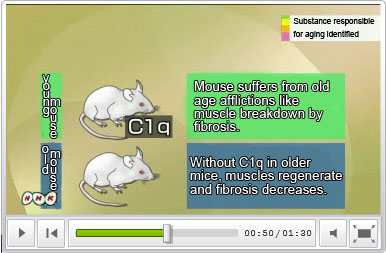
A research group headed by Professor Kazunari Komuro at Osaka University believes they have found the chemical responsible for effects of aging like deterioration of muscles.
The nasty chemical responsible for making us old and frail is called C1q. Being able to regulate it in our bodies can possibly lead to treatments and prevention of more serious health problems like heart attacks and strokes.
Professor Komuro’s team injected young mice’s legs with some extra C1q. What they found was the mice began to develop muscular fibrosis. In layman’s terms, their muscle tissue was being replaced by excess scar tissue.
For muscles to be strong they need to be very springy. Sometimes we break our muscles and scar tissue is used to “bridge the gap” while the regular muscle tissue mends itself. When we get fibrosis, too much scar tissue is created and replaces the regular muscle tissue.
Since scar tissue is too stiff to be used as muscle we begin to feel weaker, dare I say older. A similar thing can happen with our arteries and heart leading to much more disastrous results.
Professor Komuro’s team also lowered the levels of C1q in elderly mice and found that their incidence of muscular fibrosis had decreased to levels below the young mice. In essence this could very well be a legitimate anti-aging treatment.
Naturally, there is a catch to all this. Although C1q’s effects on aging are completely unheard of, this protein complex has been around for a while. It was previously known for its involvement in our immune system helping to kill off invading germs. For example, people suffering from Lupus are known to have low C1q levels.
Professor Komuro confirms this saying, “There is a possibility that C1q is linked to health problems caused by old age like, heart attacks and hardening of arteries. However, because of its connection to immunity, removing it from the body may not be good. If we can learn more about this substance then we can utilize it in treatments of various health concerns connected to aging.”
So it seems that removing C1q from your body theoretically could keep you young forever, or at least until you die from catching a cold. However, with measured usage this discovery can still have some widespread applications helping lots of people live longer into old age.
Source: NHK News (Japanese)

 Dumplings that’ll make you pretty! “Gyoza for girls” is the new food trend hitting Japan!
Dumplings that’ll make you pretty! “Gyoza for girls” is the new food trend hitting Japan! “Pecs are just like boobs!” or “The correct way to draw pectoral muscles”
“Pecs are just like boobs!” or “The correct way to draw pectoral muscles” Muscly Japanese men fill stock photo site with hilarious poses in unusual settings
Muscly Japanese men fill stock photo site with hilarious poses in unusual settings Cup Noodle makers successfully create lab-grown diced steak with authentic texture
Cup Noodle makers successfully create lab-grown diced steak with authentic texture New Japanese stock photo site is filled with photos of buff men experiencing ordinary life【Pics】
New Japanese stock photo site is filled with photos of buff men experiencing ordinary life【Pics】 Red light district sushi restaurant in Tokyo shows us just how wrong we were about it
Red light district sushi restaurant in Tokyo shows us just how wrong we were about it Akihabara pop-up shop sells goods made by Japanese prison inmates
Akihabara pop-up shop sells goods made by Japanese prison inmates McDonald’s new Happy Meals offer up cute and practical Sanrio lifestyle goods
McDonald’s new Happy Meals offer up cute and practical Sanrio lifestyle goods Beautiful Red and Blue Star luxury trains set to be Japan’s new Hokkaido travel stars
Beautiful Red and Blue Star luxury trains set to be Japan’s new Hokkaido travel stars Anime girl English teacher Ellen-sensei becomes VTuber/VVTUber and NFT
Anime girl English teacher Ellen-sensei becomes VTuber/VVTUber and NFT Sandwiches fit for a sumo served up in Osaka【Taste Test】
Sandwiches fit for a sumo served up in Osaka【Taste Test】 Japanese ramen restaurants under pressure from new yen banknotes
Japanese ramen restaurants under pressure from new yen banknotes Historical figures get manga makeovers from artists of Spy x Family, My Hero Academia and more
Historical figures get manga makeovers from artists of Spy x Family, My Hero Academia and more Limited-edition Carbonara Udon will anger noodle purists and pasta lovers 【Taste test】
Limited-edition Carbonara Udon will anger noodle purists and pasta lovers 【Taste test】 Tokyo Tsukiji fish market site to be redeveloped with 50,000-seat stadium, hotel, shopping center
Tokyo Tsukiji fish market site to be redeveloped with 50,000-seat stadium, hotel, shopping center All-you-can-drink Starbucks and amazing views part of Tokyo’s new 170 meter-high sky lounge
All-you-can-drink Starbucks and amazing views part of Tokyo’s new 170 meter-high sky lounge More foreign tourists than ever before in history visited Japan last month
More foreign tourists than ever before in history visited Japan last month French Fries Bread in Tokyo’s Shibuya becomes a hit on social media
French Fries Bread in Tokyo’s Shibuya becomes a hit on social media Studio Ghibli releases new action figures featuring Nausicaä of the Valley of the Wind characters
Studio Ghibli releases new action figures featuring Nausicaä of the Valley of the Wind characters New private rooms on Tokaido Shinkansen change the way we travel from Tokyo to Kyoto
New private rooms on Tokaido Shinkansen change the way we travel from Tokyo to Kyoto Starbucks reopens at Shibuya Scramble Crossing with new look and design concept
Starbucks reopens at Shibuya Scramble Crossing with new look and design concept Studio Ghibli glasses cases let anime characters keep an eye on your spectacles
Studio Ghibli glasses cases let anime characters keep an eye on your spectacles Beautiful Ghibli sealing wax kits let you create accessories and elegant letter decorations【Pics】
Beautiful Ghibli sealing wax kits let you create accessories and elegant letter decorations【Pics】 Studio Ghibli releases Kiki’s Delivery Service chocolate cake pouches in Japan
Studio Ghibli releases Kiki’s Delivery Service chocolate cake pouches in Japan New definition of “Japanese whiskey” goes into effect to prevent fakes from fooling overseas buyers
New definition of “Japanese whiskey” goes into effect to prevent fakes from fooling overseas buyers Our Japanese reporter visits Costco in the U.S., finds super American and very Japanese things
Our Japanese reporter visits Costco in the U.S., finds super American and very Japanese things Studio Ghibli unveils Mother’s Day gift set that captures the love in My Neighbour Totoro
Studio Ghibli unveils Mother’s Day gift set that captures the love in My Neighbour Totoro New Japanese KitKat flavour stars Sanrio characters, including Hello Kitty
New Japanese KitKat flavour stars Sanrio characters, including Hello Kitty New Pokémon cakes let you eat your way through Pikachu and all the Eevee evolutions
New Pokémon cakes let you eat your way through Pikachu and all the Eevee evolutions Disney princesses get official manga makeovers for Manga Princess Cafe opening in Tokyo
Disney princesses get official manga makeovers for Manga Princess Cafe opening in Tokyo Sales of Japan’s most convenient train ticket/shopping payment cards suspended indefinitely
Sales of Japan’s most convenient train ticket/shopping payment cards suspended indefinitely Sold-out Studio Ghibli desktop humidifiers are back so Totoro can help you through the dry season
Sold-out Studio Ghibli desktop humidifiers are back so Totoro can help you through the dry season Japanese government to make first change to romanization spelling rules since the 1950s
Japanese government to make first change to romanization spelling rules since the 1950s Ghibli founders Toshio Suzuki and Hayao Miyazaki contribute to Japanese whisky Totoro label design
Ghibli founders Toshio Suzuki and Hayao Miyazaki contribute to Japanese whisky Totoro label design Doraemon found buried at sea as scene from 1993 anime becomes real life【Photos】
Doraemon found buried at sea as scene from 1993 anime becomes real life【Photos】 Tokyo’s most famous Starbucks is closed
Tokyo’s most famous Starbucks is closed One Piece characters’ nationalities revealed, but fans have mixed opinions
One Piece characters’ nationalities revealed, but fans have mixed opinions We asked a Uniqlo employee what four things we should buy and their suggestions didn’t disappoint
We asked a Uniqlo employee what four things we should buy and their suggestions didn’t disappoint Princesses, fruits, and blacksmiths: Study reveals the 30 most unusual family names in Japan
Princesses, fruits, and blacksmiths: Study reveals the 30 most unusual family names in Japan All-in-one bed is perfect for you, you lazy bum (Also, why don’t you get a job?)
All-in-one bed is perfect for you, you lazy bum (Also, why don’t you get a job?) Hot and cold — Shirtless muscle man shaved ice cafe now open in Tokyo
Hot and cold — Shirtless muscle man shaved ice cafe now open in Tokyo Effect of Dragon Ball-style Gravity Chamber on training studied at Chubu University
Effect of Dragon Ball-style Gravity Chamber on training studied at Chubu University Attack on illicit substances! Colossal Titan stars in Tokyo Government anti-drug campaign 【Video】
Attack on illicit substances! Colossal Titan stars in Tokyo Government anti-drug campaign 【Video】 Medi Lift: the Japanese beauty product that promises facelift results without surgery
Medi Lift: the Japanese beauty product that promises facelift results without surgery Fukuoka’s new voting campaign urges voters to flex their electoral rights, get buff【Videos】
Fukuoka’s new voting campaign urges voters to flex their electoral rights, get buff【Videos】 Turning a crazy cheap country Japanese house into a home — Step 10: Mysterious water【SoraHouse】
Turning a crazy cheap country Japanese house into a home — Step 10: Mysterious water【SoraHouse】 Japanese netizen takes photo of cuddly foxes, draws burly monstrosity out of it
Japanese netizen takes photo of cuddly foxes, draws burly monstrosity out of it Does Daiso’s crazy 100-yen Face Trainer really make you more beautiful? We find out【Experiment】
Does Daiso’s crazy 100-yen Face Trainer really make you more beautiful? We find out【Experiment】 Cat gets caught in tissue box, dances into our hearts
Cat gets caught in tissue box, dances into our hearts Nothing can make us wish we were kids again harder than this Totoro Catbus rocking horse【Pics】
Nothing can make us wish we were kids again harder than this Totoro Catbus rocking horse【Pics】 Japan now has “Gyoza for Athletes”, thanks to figure skating Olympian Yuzuru Hanyu 【Taste test】
Japan now has “Gyoza for Athletes”, thanks to figure skating Olympian Yuzuru Hanyu 【Taste test】 Japanese Self-Defense Force mulls removing its ban on tattoos
Japanese Self-Defense Force mulls removing its ban on tattoos Kanna Hashimoto wins Guinness World Record for getting tissues really fast
Kanna Hashimoto wins Guinness World Record for getting tissues really fast Tokyo’s new sleep-inducing “time machine” head massage parlor looks like steampunk/sci-fi day spa
Tokyo’s new sleep-inducing “time machine” head massage parlor looks like steampunk/sci-fi day spa
Leave a Reply